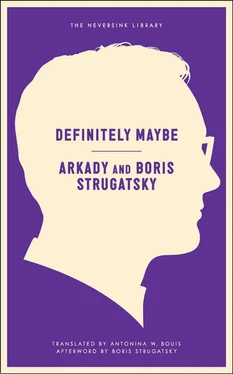“You tell,” the boy commanded, pointing at Malianov.
“Sh, sh,” Zakhar whispered, completely embarrassed.
Weingarten laughed sadly.
“Is he yours?” Malianov asked Zakhar.
“Sort of,” Zakhar answered strangely, looking away.
“His, he’s his,” Weingarten said impatiently. “By the way, that’s part of his story. Well, Dmitri, come on, don’t be shy.”
They confused Malianov utterly. He put his sandwich aside and started talking. From the very beginning, from the phone calls. When you tell the same horrible story twice in the space of two hours, you begin to find its amusing side. Malianov hadn’t even noticed how he was going at it. Weingarten began giggling, revealing his powerful, yellowish eyeteeth, and Malianov seemed to have made it his life’s work to get a laugh from Zakhar, but he never did manage it. Zakhar smiled distractedly and almost pityingly. But when Malianov got to the part about Snegovoi’s suicide, it wasn’t a laughing matter anymore.
“You’re lying!” Weingarten said hoarsely.
Malianov shrugged. “If you want to think so, that’s your prerogative,” he said. “But his door has been sealed, you can go and see for yourself.”
Weingarten sat in silence for some time, drumming his fingers on the table, his cheeks quivering in rhythm, and then he got up noisily, looking at no one, squeezed between Zakhar and the boy, and stomped away. They could hear the lock smack open; the smell of cabbage soup wafted into the apartment.
“Oho, ho-ho-ho,” Zakhar muttered glumly.
The boy immediately offered him the messy chocolate bar, demanding:
“Take a bite!”
Zakhar obediently took a bite and chewed it. The door slammed and Weingarten, still avoiding looking at any of them, squeezed back to his chair, gulped down a shot of vodka, and said hoarsely:
“And then?”
“There’s no more. Then I went up to Vecherovsky’s. The creeps left, and I went up there. I just got back.”
“And the redhead?” Weingarten asked impatiently.
“I told you, you blockhead! There was no redhead!”
Weingarten and Zakhar looked at each other.
“All right, we’ll assume that’s the truth,” said Weingarten. “That girl, Lidochka. Did she make any offers?”
“Well, I mean,” Malianov laughed nervously, “I mean, if I had wanted to, I could have.”
“Jeez, you jerk! I don’t mean that. All right, what about the investigator?”
“You know, Val, I’ve told you everything, just as it happened. Go to hell! I swear, a third grilling in one day!”
“Val,” said Zakhar indecisively, “maybe this really was something different?”
“Don’t be a fool! How could it be something else? He has work; they don’t let him do it. What else could it be? And besides, his name was mentioned.”
“Who mentioned my name?” Malianov asked, with a sense of foreboding.
“I have to pee,” the boy announced in clear bell-like tones.
They all looked at him. He examined them one by one, climbed off the stool, and said to Zakhar:
“Let’s go.”
Zakhar smiled sheepishly, said, “Well, let’s go,” and they disappeared behind the bathroom door. They chased Kaliam off the toilet seat.
“Who mentioned my name?” Malianov asked Weingarten. “What’s all this about?”
Weingarten, head bent, was listening to what went on in the toilet.
“Hell, Gubar’s really gotten stuck,” he said with some sort of sad satisfaction. “Really stuck!”
Something churned slowly in Malianov’s brain.
“Gubar?”
“Yeah. Zakhar Gubar. You know, even twisting someone around your finger…”
Malianov remembered. “Is he in rocketry?”
“Who? Zakhar?” Weingarten was surprised. “No, I doubt it. He’s a master craftsman. Though he does work in some closed place.”
“He’s not military?”
“Well, you know, all those places are to some degree…”
“I’m asking about Gubar.”
“No. He’s a techie, with magic hands. Makes computerized fleas. But that’s not the problem. The problem is that he is a man who approaches his desires with care and thoroughness. Those are his very words. And, buddy, it’s the truth.”
The boy returned to the kitchen and climbed back onto the stool. Zakhar walked in after him.
“Zakhar, you know, I just remembered. Snegovoi asked about you.”
And Malianov saw for the first time in his life just how a person turns white before your very eyes. Turns as white as a sheet.
“About me?” Zakhar mouthed.
“Yes. Last night.” Malianov hadn’t expected a reaction like that.
“Did you know him?” Weingarten asked Zakhar softly.
Zakhar shook his head silently, fished for a cigarette, spilled half the pack on the floor, and hurriedly started picking them up. Weingarten croaked: “Well, buddies, this is something that needs…” and poured some more vodka. And the boy spoke.
“Big deal! That doesn’t mean anything in itself.”
Malianov shuddered again, and Zakhar sat up and looked at the boy with something like hope.
“It’s just a coincidence,” the boy went on. “Look in the phone book, there’s at least eight Gubars in there.”
Excerpt 11…. Malianov had known him since sixth grade. They became pals in the seventh grade and shared a desk all through school. Weingarten didn’t change over the years, he just got bigger. He was always jolly, fat, carnivorous, and always collecting something or other—stamps, coins, postmarks, bottle labels. Once, this was when he was already a biologist, he decided to collect excrement because Zhenka Sidortsev brought him whale excrement from the Antarctic and Sanya Zhitniuk brought back some human excrement from Penjekent, not regular of course, but fossilized, from the ninth century. He was always bugging his friends to show him their change—looking for a special copper coin. And he was always grabbing your mail or begging for your postmarked envelopes.
And with all that, he knew his business. He had been a department head in his institute for a long time, was a member of twenty various commissions, both Soviet and international, was always traveling abroad to all kinds of congresses, and was just around the corner from a full professorship. He held Vecherovsky in the highest esteem of all his friends, because Vecherovsky was a state prize laureate, and Val dreamed of becoming one himself. He must have told Malianov a hundred times how he would put on the medal and wear it on a date. He was always a blowhard. He was a brilliant raconteur, and the dullest common events became dramas from Graham Greene or Le Carré in his retelling. But, strange as it seems, he lied very rarely and was horribly embarrassed when caught in one. For some unknown reason Irina did not like him. Malianov suspected that in their early years, before Bobchik was born, Weingarten made a pass at Irina, and she rejected him. Weingarten was a master at making out, not that he was a sex fiend or a degenerate—no, he was joyful, energetic, and as prepared for defeat as for victory. Every date was an adventure, no matter what its outcome. His wife, Sveta, an unbelievably beautiful woman, but subject to depression, had accepted his womanizing a long time ago, particularly since he doted upon her and was always getting into fights over her in public places. He liked brawling in general—it was a masochistic act to enter a restaurant in his company. In short, he had lived a smooth, happy, and successful life without any major upheavals.
Strange things began happening to him, it turned out, some two weeks before, when the series of experiments begun the previous year suddenly started yielding completely unexpected, and even sensational, results. (“You, old buddies, wouldn’t be able to understand, it has to do with reverse transcriptase—it is an RNA-dependent DNA polymerase, that’s an enzyme in the makeup of oncornaviruses, and that, I can tell you right off, buddies, smells like the Nobel Prize to me.”) In his labs no one other than Weingarten himself appreciated the results. Most of them, the way it usually is, didn’t give a damn, and other creative individuals simply decided that the series of tests was a failure. Since it was summer, everyone was impatient to go on vacation. Weingarten wouldn’t sign anyone’s leave papers. There was an uproar—hurt feelings, local grievance committee, the Party bureau meeting. And in the heat of the battle, at one of the hearings, Weingarten was semiofficially informed that there was a plan afoot to name Comrade Valentin Andreevich Weingarten as director of the newest, supermodern biological center then under construction in Dobroliubov.
Читать дальше












